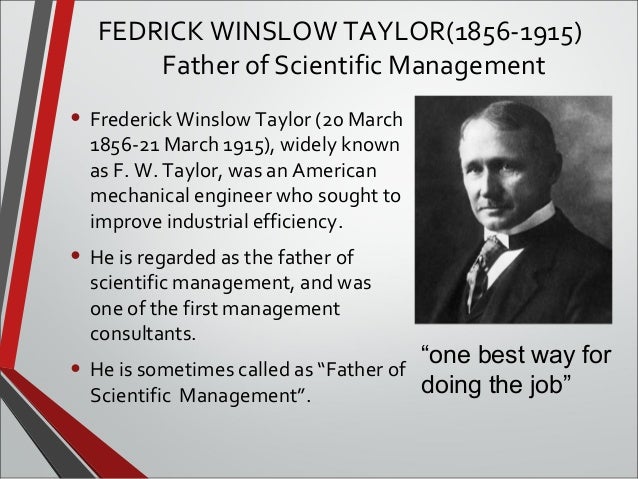Biography
* Taylor was born in 1856 to a wealthy Quaker family in Germantown, Philadelphia, Pennsylvania.
Educated early by his mother, Taylor studied for two years in France and Germany and traveled Europe for 18 months. In 1872, he entered Phillips Exeter Academy in Exeter, New Hampshire.
Upon graduation, Taylor was accepted at Harvard Law. However, due to rapidly deteriorating eyesight, Taylor had to consider an alternative career. After the depression of 1873, Taylor became an industrial apprentice patternmaker, gaining shop-floor experience at a pump-manufacturing company, Enterprise Hydraulic Works, in Philadelphia. Taylor's career progressed in 1878 when he became a machine shop laborer at Midvale Steel Works. At Midvale, Taylor was promoted to gang-boss, foreman, research director, and finally chief engineer of the works. Taylor became a student of Stevens Institute of Technology, studying via correspondence and obtaining a degree in mechanical engineering in 1883. On May 3, 1884, he married Louise M. Spooner of Philadelphia.
On October 19, 1906, Taylor was awarded an honorary degree of Doctor of Science by the University of Pennsylvania. Taylor eventually became a professor at the Tuck School of Business at Dartmouth College. Late winter of 1915 Taylor caught pneumonia and one day after his fifty-ninth birthday, on March 21, 1915 he died.
Work
Taylor was a mechanical engineer who sought to improve industrial efficiency. Taylor is regarded as the father of scientific management, and was one of the first management consultants and director of a famous firm.
Criticism of Taylor
Management theorist Henry Mintzberg is highly critical of Taylor’s methods. Mintzberg states that an obsession with efficiency allows measureable benefits to overshadow less quantifiable social benefits completely, and social values get left behind.
Taylor's methods have also been challenged by socialist intellectuals. The argument put forward relates to progressive defanging of workers in the workplace and the subsequent degradation of work as management, powered by capital, uses Taylor's methods to render work repeatable, precise yet monotonous and skill-reducing.
Scientific Management -(Contribution of F.W. Taylor)
Frederick Winslow Taylor was first person who gave Scientific Management in 1911. He also called the father of scientific management. Scientific Management was concerned to improving the operational efficiency at the shop-floor level.
According to Taylor, “scientific management means knowing exactly what you want men to do and seeing that they do it in the best and cheapest way.”
Scientific management is based on the analysis, planning and control functions. And job accomplished by analyzing, and works can selected and trained scientifically. In this, management role is to determine the kind of work for which an employee suited and hire and assign workers accordingly. Management is not responsible for execution of work but they are responsible for how the work is done. Co-operation between management and workers can enhance the work and achieve the maximum output.
Taylor called it as “Mental Revolution”, because it creates the mutual understanding, trust and confidence between the management and workers for achieving goal (higher production).
According to Taylor, “scientific management means knowing exactly what you want men to do and seeing that they do it in the best and cheapest way.”
Scientific management is based on the analysis, planning and control functions. And job accomplished by analyzing, and works can selected and trained scientifically. In this, management role is to determine the kind of work for which an employee suited and hire and assign workers accordingly. Management is not responsible for execution of work but they are responsible for how the work is done. Co-operation between management and workers can enhance the work and achieve the maximum output.
Taylor called it as “Mental Revolution”, because it creates the mutual understanding, trust and confidence between the management and workers for achieving goal (higher production).
Principles of scientific Management :-
Under scientific management, Taylor developed the following parameters for organization.
> Scientific work study
> Task planning
> Task planning
> Tools and materials
> Selection and Training
> Standardization
> Worker management interrelationships
> Differential piece wage system
> Selection and Training
> Standardization
> Worker management interrelationships
> Differential piece wage system
Objective of Scientific Management
> Scientific utilization of various resources like human power, material etc.> To provide trained and efficient work force.
> To provide standardize methods of work.
> To provide a scientific base for selecting material, and equipment.
> To provide extra wages to the worker for higher production.
> Replace old rule of thumbs to new scientific methods.
> To develop a good rapport between management and workers.
> To achieve higher production, with reduce costs and maximum efficiency.
> Less wastage.

I must appreciate you for providing such a valuable content for us. This is one amazing piece of article. Helped a lot in increasing my knowledge.
ReplyDeleteC and C++ Training Institute in chennai | C and C++ Training Institute in anna nagar | C and C++ Training Institute in omr | C and C++ Training Institute in porur | C and C++ Training Institute in tambaram | C and C++ Training Institute in velachery